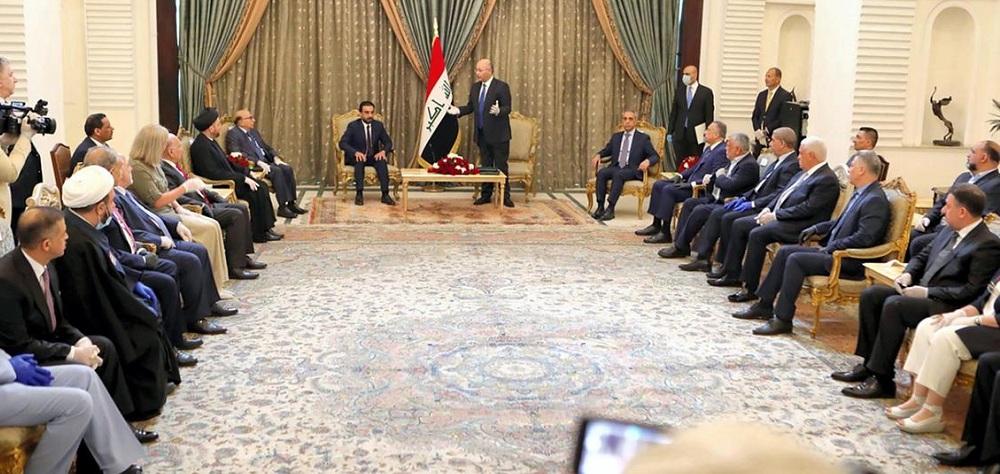Alwaght- The Iraqi political scene regularly experiences new political instability in the leadership ranks as they are based on a shaky foundation.
In a recent development and while the eyes were on Adnan Al-Zurfi who was named on March 17 by President Barham Saleh to form a new government, on Thursday, the president named a new figure for the post. Mustafa al-Kadhimi, the country’s intelligence chief was named for the post.
The nomination came as al-Zurfi withdrew his candidacy a day before. According to the reports, in the nomination, in addition to the president, parliament speaker Mohamed al-Halbousi, the president of the Supreme Judicial Council Faeq al-Zaydan, and the chief of the Federal Court Medhat Mahmoud were present. The Secretary-General of Asaib Ahl Al-Haq Hadi al-Amiri, the leader of the Nasr coalition Haider al-Abadi, the Secretary-General of the Arab Project in Iraq Khamis al-Khanjar, and the member of parliament Haider al-Mawlla also attended the event.
The nomination raises some questions: How successful will al-Kadhimi be in securing the parliament’s vote of confidence? Will he meet a fate similar to the other two PM-designates Allawi and al-Zurfi or will he manage to form a cabinet, restore political stability to Iraq, and take the country out of the crisis?
Al-Kadhimi: From journalism to PM nomination
His original name is Mustafa Abdullatif Moshatat. He was born in Baghdad in 1967 and is a law graduate. He picked his current name when he was working for local publications. He served as the editor-in-chief of Al-Esboiyah weekly owned by Barham Saleh. Although under Saddam Hussein he was living in self-exile in London, he only has Iraqi nationality and is a member of no party. In 1989, he was sentenced to death by a Baathist court in absentia. After returning Iraq in 2003, Kadhimi spent much of his time on writing and journalism. He founded Al-Dhakirah (Memory) Center to record the crimes of the Baathist rule. The Humanitarian Dialogue Foundation in Baghdad and London is run under his management.
In post-Saddam Iraq, he played an active role in settling the disputes between the political groups as a mediator, until he was appointed in 2016 by Prime Minister Haider al-Abadi the head of the Iraqi National Intelligence Service. He at the time had the support of al-Abadi’s Islamic Dawa Party. Before his appointment for the post, he served several months as an advisor at the agency. After holding the post, he tried to reform the nation’s security and intelligence structures, separating politics from security affairs.
According to the Iraqi Nasim al-Jonoub news outlet, al-Kadhimi has good relations with Iraq’s neighbor Iran. At the same time, he holds his ties with the US. That is besides good relationship with the Iraqi Kurdistan officials, to a degree that upon his arrival in Iraq in 2003, he settled in the Kurdish-majority Kirkuk.
Due to the sensitivity of his post, al-Kadhimi was not active on any social media platform. But upon his designation, he created an account on Twitter, stating “with my nomination to form a government, I promise before the honorable people of Iraq that I will work towards making a government that would put as the top priority the demands and aspirations of the Iraqis, safeguard the sovereignty and rights of the country, solves the crises, and push forward the economy.
Would be consensus over al-Kadhimi?
The significant question is that will the Iraqi political groups agree on the new PM-designate? Or he will go the same path his predecessors went after designation. Evidence shows that currently there is a consensus on al-Kadhimi more than on any other choice for the post. It should be taken into account that there is a relative agreement among the Shiite groups and even the National Iraqi Alliance, a Sunni coalition. The Kurds have said that they would respect the Shiite groups’ opinions. So, it does not seem he has a difficult road to the premiership seat.
Nechirvan Barzani, the president of the Kurdistan Regional Government (KRG) has implied he would support Saleh’s new choice. His life in Kirkuk represented small Iraq model life that brought him levels of positive interactions with the Kurds and Sunni Arabs, in addition to the Shiites. This can guarantee his success in government formation.
What are the obstacles ahead of al-Kadhimi?
In the present conditions, the new Iraqi PM choice has a set of obstacles in his way towards forming a cabinet.
1. Winning the support of the political parties for a vote of confidence to his cabinet is the first difficulty. Some political parties have said that they need to see technocratic figures chosen for the ministries. This is while some others want to have shares in the form of ministers in the new cabinet. That is what makes al-Kadhimi have a difficult mission of negotiating with the political parties.
2. The mission to satisfy the protestors is another difficulty the PM-designate has. So far, two figures named by the president were rejected by the demonstrators who have been in the streets of Baghdad and southern cities since October, protesting poor public services, unemployment, and government corruption.
3. In the single-month deadline ahead, Al-Kadhimi also has to seek solutions to the disputes between the central government and the Kurdish region.
4. And also, the PM-designate has to attempt to win the support of Muqtada al-Sadr, the powerful leader of Saeroon, the country’s biggest parliamentary bloc.



























